|
|
|
Sort Order |
|
|
|
Items / Page
|
|
|
|
|
|
|
| Srl | Item |
| 1 |
ID:
122972
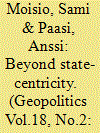

|
|
|
|
|
| Publication |
2013.
|
| Summary/Abstract |
This paper scrutinizes the challenges which scholars face when examining the interconnections between the state and geopolitics in the purported "transnational world". By discussing the relational perspective which "opens" the traditional state-as-a-monolith centric view of geopolitics, the paper sets a foundation for the present special section on the changing geopolitics of state spaces. The paper proceeds by first reflecting on the move from geopolitically "closed" to more open state territories, and then considers some of the ways the state has been examined in spatially sensitive research with respect to geopolitical scholarship. Finally, the paper maps out possible horizons for forthcoming studies on the geopolitics of state spaces.
|
|
|
|
|
|
|
|
|
|
|
|
|
|
|
|
| 2 |
ID:
123735
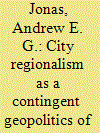

|
|
|
|
|
| Publication |
2013.
|
| Summary/Abstract |
This paper argues that it is intellectually unsustainable to separate the new economic geography of city-regionalism from its geopolitical context. The neo-liberal competition state is centrally implicated in how the city-region scale is politically orchestrated so as to bolster international competitiveness. Yet the diversity of national and sub-national forms of city-regionalism cannot be attributed to economic development considerations separately from ongoing struggles around the collective provision of social and physical infrastructure. Drawing upon selected examples from the United States, the paper demonstrates how city-regionalism expresses the contingent geopolitics of capitalism. Its overall aim is to advance theoretical knowledge both of the internal political geography of the competition state and of its external territorial relations.
|
|
|
|
|
|
|
|
|
|
|
|
|
|
|
|
| 3 |
ID:
122974


|
|
|
|
|
| Publication |
2013.
|
| Summary/Abstract |
This paper argues that it is intellectually unsustainable to separate the new economic geography of city-regionalism from its geopolitical context. The neo-liberal competition state is centrally implicated in how the city-region scale is politically orchestrated so as to bolster international competitiveness. Yet the diversity of national and sub-national forms of city-regionalism cannot be attributed to economic development considerations separately from ongoing struggles around the collective provision of social and physical infrastructure. Drawing upon selected examples from the United States, the paper demonstrates how city-regionalism expresses the contingent geopolitics of capitalism. Its overall aim is to advance theoretical knowledge both of the internal political geography of the competition state and of its external territorial relations.
|
|
|
|
|
|
|
|
|
|
|
|
|
|
|
|
| 4 |
ID:
122979
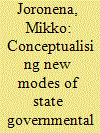

|
|
|
|
|
| Publication |
2013.
|
| Summary/Abstract |
This paper explores the ontological constitution of the neoliberal state. By enriching Michel Foucault's work on neoliberal governmentality with Heideggerian reading of the ontological conditions involved in the process, the paper argues for an understanding of neoliberalism as a mono-political process of 'enframing', through which things and human capabilities are revealed as an array of 'reserves' set available for the market rational utilisation. It is argued that the neoliberal state is not based on the ideological or discursive turn in political practices, but on the extending drive, through which the real itself, including the ethical constitution of human conducts, natural entities, and life (with its possibilities), is ontologically positioned to serve the interests of profit-making. The paper concludes by showing how the neoliberal state and the economisation of everyday life are fundamentally based on the ontological violence of concealing the openness of being, and thus, the possibility for ontological politics.
|
|
|
|
|
|
|
|
|
|
|
|
|
|
|
|
| 5 |
ID:
123732
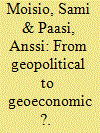

|
|
|
|
|
| Publication |
2013.
|
| Summary/Abstract |
This article underlines the significance of context-sensitive research in understanding the historical transformations of state space that have occurred as part of wider geopolitical conditions. We trace such transformations by theorizing the role of political rationalities in governance, and then by looking at how certain rationalities have surfaced in the spatial-political practices in Finland. We will scrutinise how the connection between space and population manifests in these rationalities. The paper traces at first the rise of the political rationality upon which the Finnish 'welfare state' was predicated, using the process as a touchstone to examine the recent political rationality which displays a will to transform the state and its spatiality. Our analysis reveals that an increasingly economistic and transnationally oriented geopolitical calculation of space is taking place in the ongoing governmental interventions aimed at modifying both the spatial structures and the qualities of populations in the name of national competitiveness.
|
|
|
|
|
|
|
|
|
|
|
|
|
|
|
|
| 6 |
ID:
122975
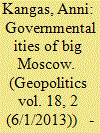

|
|
|
|
|
| Publication |
2013.
|
| Summary/Abstract |
In the summer of 2011, the Russian state initiated a project to significantly expand the size of its capital, Moscow, developing it into a polycentric urban formation and a 'global city'. This article approaches the global city as a circulating form of governmentality by way of analysing discussions prompted by the plan for Big Moscow. It proposes that the logic of optimisation at work in the plan implies that it can be characterised as a neoliberal reform. The focus of the essay is on how neoliberalism becomes particularised in the context of the analysed discussions as it gains backing from constellations of authoritarian politics or historically rooted forms of cultural understanding. This does not render the examined case an anomaly but rather provides a paradigmatic example of how the productive entwinement of seemingly disparate governmental techniques is a necessary effect of the installation and functioning of the neoliberal regime.
|
|
|
|
|
|
|
|
|
|
|
|
|
|
|
|
| 7 |
ID:
122982


|
|
|
|
|
| Publication |
2013.
|
| Summary/Abstract |
This paper builds upon previous research on American state-of-the-union addresses and Russian geopolitics by examining how the Kremlin has represented Russia's geographic and geopolitical position in the post-Soviet era. It analyses presidential addresses to the Federal Assembly from 2000 to 2011, a period encompassing Vladimir Putin's first two terms as president and the single term of Dmitry Medvedev. In addition to exploring general trends evident in these speeches, this paper also provides in-depth analyses of three major themes: Russia's civilisational identity, the state of the international system and Russia's role within it, and global economics. We find that the legacies of the Cold War-era perceptions of threat, as well as dissatisfaction with the Cold War's resolution, remain salient in these speeches. However, there is some movement toward a broadening of Russia's cognitive map.
|
|
|
|
|
|
|
|
|
|
|
|
|
|
|
|
| 8 |
ID:
122983
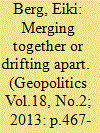

|
|
|
|
|
| Publication |
2013.
|
| Summary/Abstract |
One way to approach conflict management is to use a four-dimensional political legitimacy criterion, which could set the agenda for enhancing peace prospects in Cyprus, Moldova and Bosnia and Herzegovina (BiH). Here the argument is that through measuring the internal legitimacy of conflicting parties and then comparing and contrasting the given empirical values on the scales of cohesion/security and democracy/performance, we may be able to distinguish conflicting pairs either "merging together" or "drifting apart", depending on how the secessionist entities position themselves vis-à-vis their parent states. Empirical facts on the ground tell us that Cyprus may have the biggest chances of reunification, whereas Moldova's perspective looks meagre. The BiH, which has preserved its territorial integrity, faces real secessionist challenges, given the illegitimacy of the state and a manifest dissatisfaction with systemic deficiencies.
|
|
|
|
|
|
|
|
|
|
|
|
|
|
|
|
| 9 |
ID:
122977


|
|
|
|
|
| Publication |
2013.
|
| Summary/Abstract |
This essay opens a perspective of potential governmentality on state transformation. It is argued that potential governmentality is a process of building a visionary script of an emergent governmental form linked to the creation of a new politico-economic path in a state. The essay discusses the idea of potential governmentality as a heuristic, elaborates the idea of state vigour as a generic form of governmentality and presents a case study in the context of the Finnish state. The essay is an attempt to chart a particular form of state transformation in the context of diffusing geoeconomic calculation.
|
|
|
|
|
|
|
|
|
|
|
|
|
|
|
|
| 10 |
ID:
122978


|
|
|
|
|
| Publication |
2013.
|
| Summary/Abstract |
The state space concept is part of attempts to dismantle the 'territorial trap' and the concomitant dichotomy between national 'inside' and international 'outside'. This paper contributes to this scholarship by proposing the concept of transnational field as a tool for a nuanced understanding of the intermingling of the national and the global. The paper argues that the formative logic of globalization is not simply the growth of economic interconnections and dependencies, but also the dynamism related to competition and collaboration structuring inclusions, exclusions and awards in transnational fields.
|
|
|
|
|
|
|
|
|
|
|
|
|
|
|
|
| 11 |
ID:
122976


|
|
|
|
|
| Publication |
2013.
|
| Summary/Abstract |
This paper adopts a critical regionalist perspective to bring new insights into the drivers of state spatial transformation in sub-national economic development governance in the UK. It demonstrates that multiple forms of state spatiality are emerging in the context of late capitalism which are both territorial and relational. The paper argues that these developments cannot be explained as a simple re-scaling of the geopolitical project of competitiveness. Instead they reflect an array of political forces both in and of space, which are calling into question the functionality of regional state spaces for the governance of economic development.
|
|
|
|
|
|
|
|
|
|
|
|
|
|
|
|
| 12 |
ID:
122980


|
|
|
|
|
| Publication |
2013.
|
| Summary/Abstract |
Maps are much more than geographic tools. They are powerful visual icons of statehood and identity. Created by agents tainted by their own historical subjectivity, maps are saturated with multiple levels of meaning, while their perceived status as accurate scientific tools lends them an authority which the map-reader is not meant to question. This paper examines maps from a Gadamerian hermeneutic perspective to investigate the layers of meaning embedded into these unquestioned, hypnotic emblems, and proposes that the maps produced and displayed by the European Union on its websites and in its continental currency are texts imbued with powerful imperial imaginations which reify a sense of collective identity and apparent superiority. This imagination is entwined with the territory of Europe and ultimately defines what it is to be European through the exclusion of 'the Other' - those Europeans deemed unworthy of inclusion in the European imperium. Ultimately, the paper argues that maps of the Union reflect a subconscious - yet gradually emerging - imagination of Empire.
|
|
|
|
|
|
|
|
|
|
|
|
|
|
|
|
| 13 |
ID:
122981
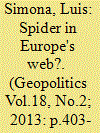

|
|
|
|
|
| Publication |
2013.
|
| Summary/Abstract |
This article examines the relationship between geopolitical change and the evolution of French grand strategy from Iraq to Libya. While the European Union (EU) and the bilateral relationship with Germany continue to feature high in French grand strategy, France has in the space of just a few years substantially strengthened its Atlantic connection (with the US, Britain and NATO) and upgraded its relationship with other European powers - particularly Russia. It is argued that the driving reason behind this diversifying trend is the weakening of the US-led West, both globally and in Europe. If US military power laid the foundations of order in and around Europe, America's shift of geostrategic attention eastwards is underpinning a political destructuring of Europe and its broader neighbourhood. For one thing, Europe is moving towards a more multipolar balance, as evidenced by Russia's resurgence in the east and southeast, Turkey's drifting from the EU and growing influence in the continent's southeast and, crucially, Germany's increasing influence over the direction of the EU. For another, France's so-called axis of strategic priority (Northern Africa, the Sahel, Levant, Horn of Africa/Red Sea and the Gulf) is characterised by mounting instability and increasing penetration by external powers. Against this backdrop, the special relationship with Germany and the EU are insufficient to guarantee French influence in Europe, the stability of Europe's broader neighbourhood or France's aspirations to global power. In an increasingly uncertain global and regional environment, France is seeking to reconcile a deeper politico-military relationship with Britain (and the United States), a special relationship with Germany in the politico-economic sphere and strong ties with Russia, thereby positioning itself as a sort of spider in an increasingly multipolar European geopolitical web.
|
|
|
|
|
|
|
|
|
|
|
|
|
|
|
|
|
|
|
|
|